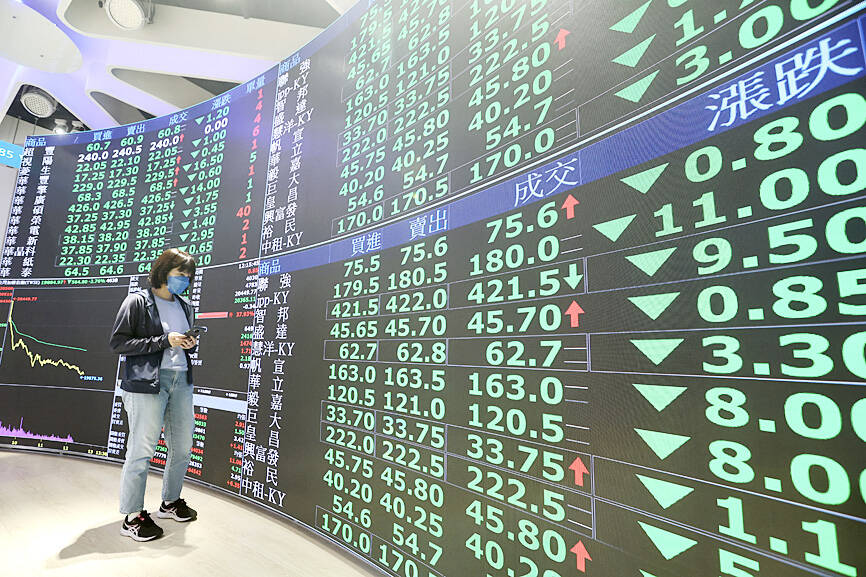The TAIEX yesterday tumbled 2.68 percent, or 547.81 points, to 19,901.96, as escalating military conflict in the Middle East unnerved investors and triggered panic sell-offs across the board, analysts said.
It was the first time the TAIEX dipped below 20,000 points since March 20.
The slump came on the heels of successive retreats on Wall Street, as global bourses assimilated Iran’s attack on Israel, which could usher in a new phase of tension, uncertainty and confrontation.

Photo: CNA
“The decline is the steepest since October 2022 and pushed the main board below the 20,000-point mark,” Taishin Investment Trust Co (台新投信) said.
Geopolitical tensions aside, fund outflows by foreign portfolio managers and domestic proprietary traders also played a part in the drab showing, Taiwan Stock Exchange data showed.
Turnover was NT$534.908 billion (US$16.46 billion) after foreign players cut their holdings by NT$38.8 billion, while proprietary traders lowered their positions by NT$20.08 billion, the local bourse said.
Mutual funds raised their stakes by NT$1.6 billion.
The Securities and Futures Bureau said that Taiwan’s economic fundamentals remain healthy and it is better to approach investment from a long-term perspective.
The Financial Supervisory Commission would take any necessary measures to respond to changes in international politics that affect the global economy, officials said.
More than 80 percent of shares fell, with heavyweight technology shares hit the hardest.
Shares of MediaTek Inc (聯發科), the world’s biggest 5G smartphone chip designer, plunged 4.95 percent to NT$1,055, while those of iPhone assembler Hon Hai Precision Industry Co (鴻海精密) fell 3.42 percent to NT$141 in the wake of poor iPhone sales.
Shares of Taiwan Semiconductor Manufacturing Co (TSMC, 台積電) fared better than the TAIEX given their 2.23 percent fall to NT$788, the local bourse said.
TSMC is due to unveil its first-quarter earnings tomorrow, and shed light on its business outlook and industry trends.
While mindful of geopolitical twists, investors would pay close attention to TSMC’s financial results and business guidance, Nomura Asset Management Taiwan Ltd (野村投信) said.
TSMC is responsible for supplying advanced chips used in the latest smartphones and artificial intelligence tools.
Popular exchange-traded funds (ETFs) also ranked high on the selling lists of foreign portfolio managers and proprietary traders.
They slashed positions in ETFs featuring high cash dividends with the stock codes 00940, 00929, 00919, 0056 and 00878 in favor of the US dollar.
The New Taiwan dollar yesterday shed another NT$0.112 versus the greenback to close at NT$32.490 in Taipei trading, the central bank’s Web site showed.
The NT dollar has weakened 1.6 percent so far this month, as hotter than expected US inflation data could prompt the US Federal Reserve to postpone interest rate cuts.

SEMICONDUCTORS: The German laser and plasma generator company will expand its local services as its specialized offerings support Taiwan’s semiconductor industries Trumpf SE + Co KG, a global leader in supplying laser technology and plasma generators used in chip production, is expanding its investments in Taiwan in an effort to deeply integrate into the global semiconductor supply chain in the pursuit of growth. The company, headquartered in Ditzingen, Germany, has invested significantly in a newly inaugurated regional technical center for plasma generators in Taoyuan, its latest expansion in Taiwan after being engaged in various industries for more than 25 years. The center, the first of its kind Trumpf built outside Germany, aims to serve customers from Taiwan, Japan, Southeast Asia and South Korea,

Gasoline and diesel prices at domestic fuel stations are to fall NT$0.2 per liter this week, down for a second consecutive week, CPC Corp, Taiwan (台灣中油) and Formosa Petrochemical Corp (台塑石化) announced yesterday. Effective today, gasoline prices at CPC and Formosa stations are to drop to NT$26.4, NT$27.9 and NT$29.9 per liter for 92, 95 and 98-octane unleaded gasoline respectively, the companies said in separate statements. The price of premium diesel is to fall to NT$24.8 per liter at CPC stations and NT$24.6 at Formosa pumps, they said. The price adjustments came even as international crude oil prices rose last week, as traders

Taiwan Semiconductor Manufacturing Co (TSMC, 台積電), which supplies advanced chips to Nvidia Corp and Apple Inc, yesterday reported NT$1.046 trillion (US$33.1 billion) in revenue for last quarter, driven by constantly strong demand for artificial intelligence (AI) chips, falling in the upper end of its forecast. Based on TSMC’s financial guidance, revenue would expand about 22 percent sequentially to the range from US$32.2 billion to US$33.4 billion during the final quarter of 2024, it told investors in October last year. Last year in total, revenue jumped 31.61 percent to NT$3.81 trillion, compared with NT$2.89 trillion generated in the year before, according to

PRECEDENTED TIMES: In news that surely does not shock, AI and tech exports drove a banner for exports last year as Taiwan’s economic growth experienced a flood tide Taiwan’s exports delivered a blockbuster finish to last year with last month’s shipments rising at the second-highest pace on record as demand for artificial intelligence (AI) hardware and advanced computing remained strong, the Ministry of Finance said yesterday. Exports surged 43.4 percent from a year earlier to US$62.48 billion last month, extending growth to 26 consecutive months. Imports climbed 14.9 percent to US$43.04 billion, the second-highest monthly level historically, resulting in a trade surplus of US$19.43 billion — more than double that of the year before. Department of Statistics Director-General Beatrice Tsai (蔡美娜) described the performance as “surprisingly outstanding,” forecasting export growth